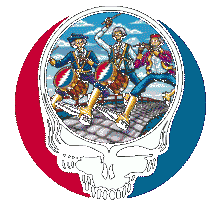The Positive Power of Mickey's Music

Here's a great article from VOAnews.com:
Musicians Bridge Political, Religious Conflicts as Peacemakers
By Jan Sluizer San Francisco
Sluizer report (MP3) - Download 1.4 Mb
Sluizer report (Real) - Download 972 k
Listen to Sluizer report (Real)
The power of music is far-reaching but elusive. It can spark myriad emotions in someone listening alone at home to its rhythms and lyrics, it can transfix a crowd of thousands taking in a concert in a large hall or stadium… and many musicians believe it can bring peace to a troubled world.
For the past six years, Israeli singer, songwriter, and pianist Shlomo Gronich has been performing with Palestinian singer Lubna Salame as 'Adamai'. The two met while recording the anthem of a group promoting coexistence in Israel. At a recent concert in San Francisco, Gronich acknowledged his partner and the multi-ethnic ensemble as he introduced the song, Zman es Salaam. "It means 'It's Time For Peace,'" he told the audience. "I know it sounds naïve, but here, look at the stage - the miracle really happens here so it should happen everywhere."
Adamai is not the only unexpected pairing of musical peacemakers. The goal of the Full Circle Project of Philadelphia, Pennsylvania is to bring Islamic and Western musicians together, and counselors in Northern Ireland use music therapy, including concerts and individual performances, with Catholic and Protestant children.
Mickey Hart, former drummer with the Grateful Dead band, has spent much of his professional life studying the music of various cultures and knows first-hand the power of music. "You don't have to know someone else's language to enjoy a musical moment with them," he points out. He's created many award-winning musical moments with percussionists and musicians from every corner of the globe. "So," he asks rhetorically, "can people get together from different walks of life and different cultures and share in this marvelous mysterious moment, which we call music? Yes, absolutely." The problems may go away, he says, but maybe not. "There still will be fears. There'll be hopes, there'll still be dreams and you'll understand a person more after sharing an auditory driving experience with them."
That belief is also behind Gary Malkin's efforts. The pianist produces and promotes what he calls 'global healing events.' After fighting broke out between Israel and Hezbollah militants in July, Malkin decided to pull together a concert of Israeli and Arab musicians in San Francisco. He called a friend at the city's Grace Episcopal Cathedral to ask about staging a concert there.
He recalls, "I said: 'Could you imagine a more eloquent way to respond to the tragedies that have been coming out of the Middle East than to have musicians that represent a number of the countries and religions that are in that region playing together peaceably?' And he looked at me, he said: 'I couldn't imagine anything more magical.' And I said: 'Let's do it.' And he said: 'Let's go.'"
That conversation led to a sold-out performance in the church's huge chapel. Among the head-liners: Israeli Yair Dalal and Palestinian-Jordanian Naser Musa. They performed a song that Musa composed especially for the two of them, called Salaam, Shalom.
Lubna Salame, of the band Adamai, says when musicians sing about peace, people listen. "I always believe that music can do what the political cannot do, because music is from the spirit to the spirit, from the heart to the heart," she explains. "Some of these people tell me it's not the right time to do [what you're doing]. But I tell them there is no right time. We have to start." Concerts for political causes have raised money - and awareness - since 1971, when Indian sitar master Ravi Shankar and ex-Beatle George Harrison organized the star-studded Concert for Bangladesh, to help starving refugees from that nation's war of independence. Since then, Bob Geldof's 'Live Aid' has raised money for famine relief in Ethiopia, singer/songwriter Willie Nelson's 'Farm Aid' continues to help small American farmers in danger of losing their land, and Jamie McGonnigal produces "Music is power," Hart concludes, "and music has power to heal psychologically, spiritually, physically, emotionally, socially."
Musicians who move between cultures, raising their voices in a united plea for harmony, spread hope that the power of music can also heal politically.
****end of article****
please see the original article for more links



0 Comments:
Post a Comment
<< Home